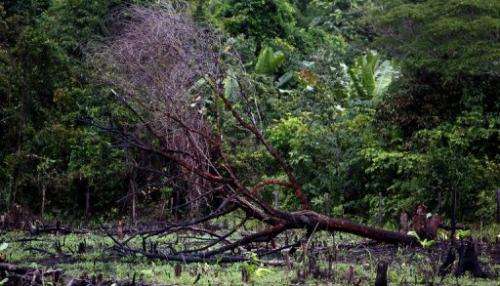Prosecutors take issue with Brazil's new forestry code

Brazil's new forestry code—approved last year at the urging of the powerful agrobusiness sector—faced a constitutional challenge Tuesday from federal prosecutors afraid it threatens the Amazon rainforest.
The prosecutors filed three actions against the legislation before the Supreme Court, demanding it be partially suspended on grounds it "reduces and abolishes areas previously viewed as protected," a statement from their office said.
They also challenged the amnesty granted to those who illegally cleared forest land prior to 2008, one of the most contentious points of the new code.
Designating land as protected aims to "preserve and restore essential ecological processes," said acting prosecutor Sandra Cureau in her filing.
Last October, the final text of the new code came into force after President Dilma Rousseff vetoed the most radical aspects of the measure.
Rousseff's vetoes capped years of congressional wrangling over the disputed reform between the pro-farm lobby and environmentalists who fear the new code will lead to further deforestation in the Amazon.
More than 60 percent of Brazil's 8.5 million square kilometers (3.3 million square miles) are jungles and forests, but two-thirds of it is either privately owned or its ownership is undefined.
The previous code, which dated back to 1965 and which farmers said was not being respected, limited the use of land for farming and mandated that up to 80 percent of privately-owned land in the Amazon rainforest remain intact.
After Rousseff's vetoes, the new text maintains that obligation, but allows landowners to cultivate riverbanks and hillsides that were previously exempt, and eases restrictions for small landowners who face difficulties in recovering illegally cleared land.
It also provides an amnesty from fines for anyone who illegally cleared trees before July 2008.
Key reasons for the destruction of the world's largest rainforest are fires, the advance of agriculture and stockbreeding, and illegal trafficking in timber and minerals.
Deforestation has slowed since Brazil declared war on the practice in 2004 and vowed to cut it by 80 percent by 2020.
Officials said in November the Amazon lost 4,656 square kilometers (1,797 square miles) of rainforest between August 2011 to July 2012, 27 percent less than the previous year, and the lowest rate since Brazil began monitoring.
(c) 2013 AFP




















